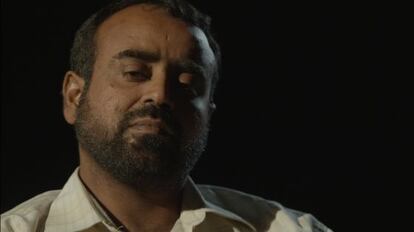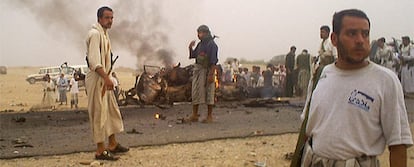Al Qaeda mole tried to stop 2007 Yemen attack against Spanish tourists
Joint EL PAÍS-Al Jazeera investigation unveils testimony by former jihadist Hani Mujahid says Yemeni ex-president did nothing to stop the killing of Spaniards

A 2007 Al Qaeda attack against Spanish tourists at the temple of Mahram Bilqis in Yemen could have been prevented, according to an informant.
Hani Muhammad Mujahid, a former member of Al Qaeda who began working as an informant for Yemen’s national security agencies, says that he twice alerted antiterrorist services about the upcoming attack in which 10 people died, eight of them Spanish.
Yet authorities did nothing to prevent it, Mujahid explains in a television interview that is part of a joint investigation by Al Jazeera and EL PAÍS. The interview was conducted somewhere outside Yemen.
We thought we were working with patriotic people, and found we were working with a gang, not with a lawful state that protects its people”
Hani Mujahid, informant for the Yemeni government
The informant says he also warned Yemeni authorities about an Al Qaeda attack against the US Embassy in September 2008, and that nothing was done to prevent that.
He now accuses the regime of former president Ali Abdullah Saleh (1990-2012) of allowing Al Qaeda to act in the country.
Mujahid joined the jihad in Afghanistan in 1998 and was a member of Al Qaeda until his arrest by Pakistani intelligence and the CIA in 2004, then served two years in a Yemeni prison. Upon his release, he began working as a government informant.

“My role was to penetrate the organization and inform about its plans... I was paid for my work and my service to the country,” he says. It was not possible to reach the government officials that Mujahid worked for.
The informant says he warned security agencies one week before the attack.
“I telephoned Colonel Hmud Al-Qadasi, a relative of mine and head of the counterterrorism department in Taiz province. I spoke with him. I told him there was a car ready to attack Spanish tourists in Maarib province, at the temple of Bilqis. I said they should stop the operation immediately, that a security or military force should move out immediately to prevent it. He told me he would quickly inform [the capital] Sana’a.”
Mujahid claims he alerted authorities a second time.
“Later I called Nabil Al Qilaisi [...] I gave them up-to-the-minute information and told them who was there. I told them that the car was far away and that I didn’t know who was inside. He said OK. I put myself in danger, I was terrified when I made the call. I was worried that I might be seen. I knew how to inform quickly, but I was terrorized and psychologically collapsed. If anyone finds you out, it’s over for you...”
Hani Muhammad Mujahid, a 38-year-old father of three, says that the attack against the Spanish tourists was planned by Hamza Al Jayiti, Abu Basir (AKA Nasir Al Wahaishi) and Abu Hurayrah (AKA Qasim Al Raimi). The two latter were his closest friends in Afghanistan.
Asked why Al Qaeda chose to target Spaniards, the informant says that the operation was quite simple and that Abu Hurayrah knew exactly what the tourists’ movements would be.
“The goal was to prove that the organization was still alive in Yemen and that it was able to fight against the West and the Americans... Their only desire was to kill foreigners. Why? Because they said that they [the foreigners] were at war against us, against Islam, and because they were part of the international coalition led by the United States.”
I put myself in danger, I was terrified when I made the call. I was worried that I might be seen”
Hani Mujahid
Mujahid adds that after the attack his relative, Colonel Hmud, told him that he did not believe the country’s rulers were honest and good patriots.
“We thought we were working with patriotic people, and found we were working with a gang, not with a lawful state that protects its people.”
This informant’s testimony adds new information about the alleged perpetrators of and collaborators in the 2007 attack – individuals who were never tried or convicted because the Spanish justice system was forced to shelve the case in 2011, given the lack of cooperation by Yemeni authorities.
Now, the former Al Qaeda member is willing to provide testimony to the Spanish justice system. His lawyer, Abdurraman Barmen, says his client once told him: “Consider me a suicide bomber, but in a different way. Information will be my bomb.”
Tu suscripción se está usando en otro dispositivo
¿Quieres añadir otro usuario a tu suscripción?
Si continúas leyendo en este dispositivo, no se podrá leer en el otro.
FlechaTu suscripción se está usando en otro dispositivo y solo puedes acceder a EL PAÍS desde un dispositivo a la vez.
Si quieres compartir tu cuenta, cambia tu suscripción a la modalidad Premium, así podrás añadir otro usuario. Cada uno accederá con su propia cuenta de email, lo que os permitirá personalizar vuestra experiencia en EL PAÍS.
¿Tienes una suscripción de empresa? Accede aquí para contratar más cuentas.
En el caso de no saber quién está usando tu cuenta, te recomendamos cambiar tu contraseña aquí.
Si decides continuar compartiendo tu cuenta, este mensaje se mostrará en tu dispositivo y en el de la otra persona que está usando tu cuenta de forma indefinida, afectando a tu experiencia de lectura. Puedes consultar aquí los términos y condiciones de la suscripción digital.








































